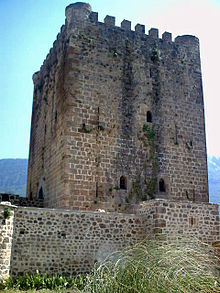20:
273:
defends
Alfonso III from the charge of a scholarly error in equating Bardulia with early Castile, but his words leave the matter somewhat open: "It is very probable that Alfonso III did not commit a error of erudition in identifying Bardulia with Castile," and that "If there was an error in the
321:"Si había error en la identificación de Vardulia y Castilla —escribe—, ese error estaba difundido en la misma Castilla durante el siglo IX, lo que se aviene mal con su origen erudito."
274:
identification of
Bardulia with Castile, that error propagates from Castile itself in the 9th century, which is hard to reconcile with it being of erudite origin.
270:
339:
81:
40:
202:
84:
in the 6th through 8th centuries—occasioned a westward migration of the
Varduli to what the documents of the
112:
211:" ("he stayed some time in Bardulia to take a wife"). In another place Jiménez de Rada closely parallels the
294:
269:
Addressing the claim that
Bardulia was simply a scholarly term, the 20th century medievalist and statesman
253:
148:
241:
308:"Es muy probable que Alfonso III no cometiera un error erudito al identificar Bardulies con Castilla."
231:
144:
171:
44:
77:
58:
157:
53:, the name of a tribe who, in pre-Roman and Roman times, populated the eastern part of the
85:
117:
54:
333:
28:
194:
62:
147:
was traveling to take a wife, and where he heard of the death of his predecessor
76:
It has been speculated that a possible expansion of the Basque territories—
257:
110:
is a 10th-century chronicle that describes it as a former name for
Castile. The
19:
121:
70:
165:
cum
Bardulies, quae nunc Castella vocatur, ad accipiendan uxorem accederet.
66:
234:, basically a compilation of earlier chronicles, makes four mentions of
49:
181:
65:. Some assert that the Varduil also encompassed or assimilated the
39:
is the ancient name of the territories that composed the primitive
18:
177:
205:, in an allusion to Ramiro, that on the death of Alfonso II, "
124:. Similar passages recur in the texts of later chroniclers.
134:
Bardulies qui (quae) nunc uocitatur (appellatur) Castella
221:" ("nobles of Bardulia, which is now called Castile").
208:
in
Bardulia pro accipienda uxore aliquandiu fecit moram
261:
247:
239:
216:
206:
185:
169:
163:
155:
138:
132:
137:" ("Bardulia, which is now called Castella") and "
293:Angel de los Rios y Rios, "El Baston de Laredo",
252:(probably Abu-Otman, a distinguished general of
16:Ancient name for territories in northern Spain
319:
306:
225:
218:nobiles Barduliae, quae nunc Castella dicitur
8:
176:and the forged donation to the bishops of
143:" ("the Bardulian Province") where King
283:
193:In the first half of the 13th century,
120:, uses the term four times, in various
43:in the north of what later became the
297:, p.555. Accessed online 6 July 2012.
7:
27:in Lezana de Mena (near present-day
271:Claudio Sánchez-Albornoz y Menduiña
266:" ("when he arrived in Bardulia").
184:(11th-12th century) also refer to
14:
131:. Among the passages there are "
127:There are two variants of the
1:
340:Historical geography of Spain
106:The first written mention of
295:Revista de España, Volume 90
61:, primarily in present-day
35:According to some sources,
356:
263:quando venit in Bardulias
260:; 806 AD), in Pisuerga, "
213:Chronicle of Alfonso III
129:Chronicle of Alfonso III
113:Chronicle of Alfonso III
203:Rodrigo Jiménez de Rada
154:The early 12th-century
140:Barduliensem provintiam
31:, in historic Bardulia.
320:
307:
262:
248:
240:
226:
217:
207:
186:
170:
164:
156:
139:
133:
80:, an expansion to the
47:. The name comes from
32:
23:Medieval tower of the
242:Annales Compostellani
22:
145:Ramiro I of Asturias
254:Hisham I of Córdoba
172:Chronica Naierensis
168:" The 12th-century
162:says of Ramiro I: "
45:province of Burgos
33:
78:Late Basquisation
59:Iberian Peninsula
347:
324:
323:
317:
311:
310:
304:
298:
292:
288:
265:
251:
245:
232:Alfonso el Sabio
229:
220:
210:
189:
175:
167:
161:
158:Historia Silense
142:
136:
355:
354:
350:
349:
348:
346:
345:
344:
330:
329:
328:
327:
318:
314:
305:
301:
290:
289:
285:
280:
256:) died in 844 (
227:Crónica General
197:twice mentions
104:
86:Low Middle Ages
17:
12:
11:
5:
353:
351:
343:
342:
332:
331:
326:
325:
312:
299:
282:
281:
279:
276:
103:
94:
82:Basque Country
15:
13:
10:
9:
6:
4:
3:
2:
352:
341:
338:
337:
335:
322:
316:
313:
309:
303:
300:
296:
287:
284:
277:
275:
272:
267:
264:
259:
255:
250:
244:
243:
237:
233:
228:
222:
219:
214:
209:
204:
200:
196:
191:
188:
183:
179:
174:
173:
166:
160:
159:
152:
150:
146:
141:
135:
130:
125:
123:
119:
116:, written in
115:
114:
109:
102:
98:
95:
93:
91:
87:
83:
79:
74:
72:
68:
64:
60:
57:coast of the
56:
52:
51:
46:
42:
38:
30:
29:Valle de Mena
26:
21:
315:
302:
291:(in Spanish)
286:
268:
246:, says that
235:
223:
212:
198:
195:Lucas de Tuy
192:
153:
128:
126:
111:
107:
105:
100:
96:
89:
75:
48:
36:
34:
24:
258:Spanish era
122:declensions
238:, and the
224:The first
201:, as does
149:Alfonso II
71:Autrigones
55:Cantabrian
249:Albutaman
63:Guipúzcoa
334:Category
236:Bardulia
199:Bardulia
187:Bardulia
108:Bardulia
97:Bardulia
90:Bardulia
67:Caristii
37:Bardulia
25:Velascos
101:Castile
50:Varduli
41:Castile
182:Oviedo
278:Notes
118:Latin
88:call
180:and
178:Lugo
99:and
69:and
230:of
215:: "
336::
190:.
151:.
92:.
73:.
Text is available under the Creative Commons Attribution-ShareAlike License. Additional terms may apply.
